AI (artificial intelligence) is expanding at a rapid pace, and businesses are relying more on agentic AI to optimize various strategies and enhance customer experiences.
Agentic AI systems are one of the latest technologies in our automated world. They are significant because they represent a major leap forward, allowing marketers to automate complex marketing strategies.
But how are these AI agents shaping the future of technology? Since agentic AI is already making waves in marketing, all marketers must stay ahead of the curve and implement this technology. In this post, we’ll explore agentic AI, how it works, and its profound impact on digital marketing.
Key Highlights on Agentic AI
- Agentic AI is an autonomous system that analyzes vast amounts of data in real-time to make strategic marketing decisions.
- Agentic AI systems differ from generative AI because they act independently from human intervention.
- Agentic workflows can benefit an organization in many ways, such as by processing data and acting upon it independently, analyzing new data immediately, learning from past customer experiences, and suggesting marketing decisions that align with your goals.
- Agentic AI is transforming the marketing world by improving customer personalization, automating repetitive decision-making tasks, better adapting to customer conversations, improving predictive analysis, and enhancing various marketing strategies, such as SEO and social media marketing.
- Implementing AI agents can carry risks, such as losing control of essential marketing decisions, biases in marketing and customer communication, data security vulnerabilities, impacts on job creation, and over-reliance on AI.
TABLE OF CONTENTS:
What Is Agentic AI?
Agentic AI is a form of artificial intelligence capable of making decisions and taking actions in real-time.
Unlike traditional AI, which relies heavily on human input, AI agents can act independently, adapt to new data, and continuously improve performance.
Currently, 10% of organizations use AI agents, which will only increase in the next several years. While traditional AI might help marketers analyze data or automate specific tasks, agentic AI systems can make strategic decisions without human oversight. This ability to operate autonomously makes it a powerful tool for digital marketing teams that must keep up with consumer behavior, trends, and competition.
Agentic AI vs. Generative AI Systems
In your day-to-day life as a marketer, you’re likely using generative AI agents. Common examples include using ChatGPT and other natural language processing platforms to write ad copy or using Midjourney to create an image for a social media post.
But does agentic AI operate similarly? Agentic AI refers to systems designed to perform tasks autonomously, make decisions, and act independently to achieve specific goals. In other words, agentic AI doesn’t require human direction or input.
Generative AI, on the other hand, requires human intervention to direct and manipulate results. This is why generative AI focuses on creating new content, such as text, images, or music, based on human prompts and patterns from existing data.
Another way to examine these differences is by identifying the end result.
While agentic AI emphasizes action and goal-directed behavior, generative AI primarily concerns content production. While agentic and generative AI are complementary, and marketers can use both in their campaigns, they’re distinct branches of artificial intelligence.
Key Benefits of Agentic AI
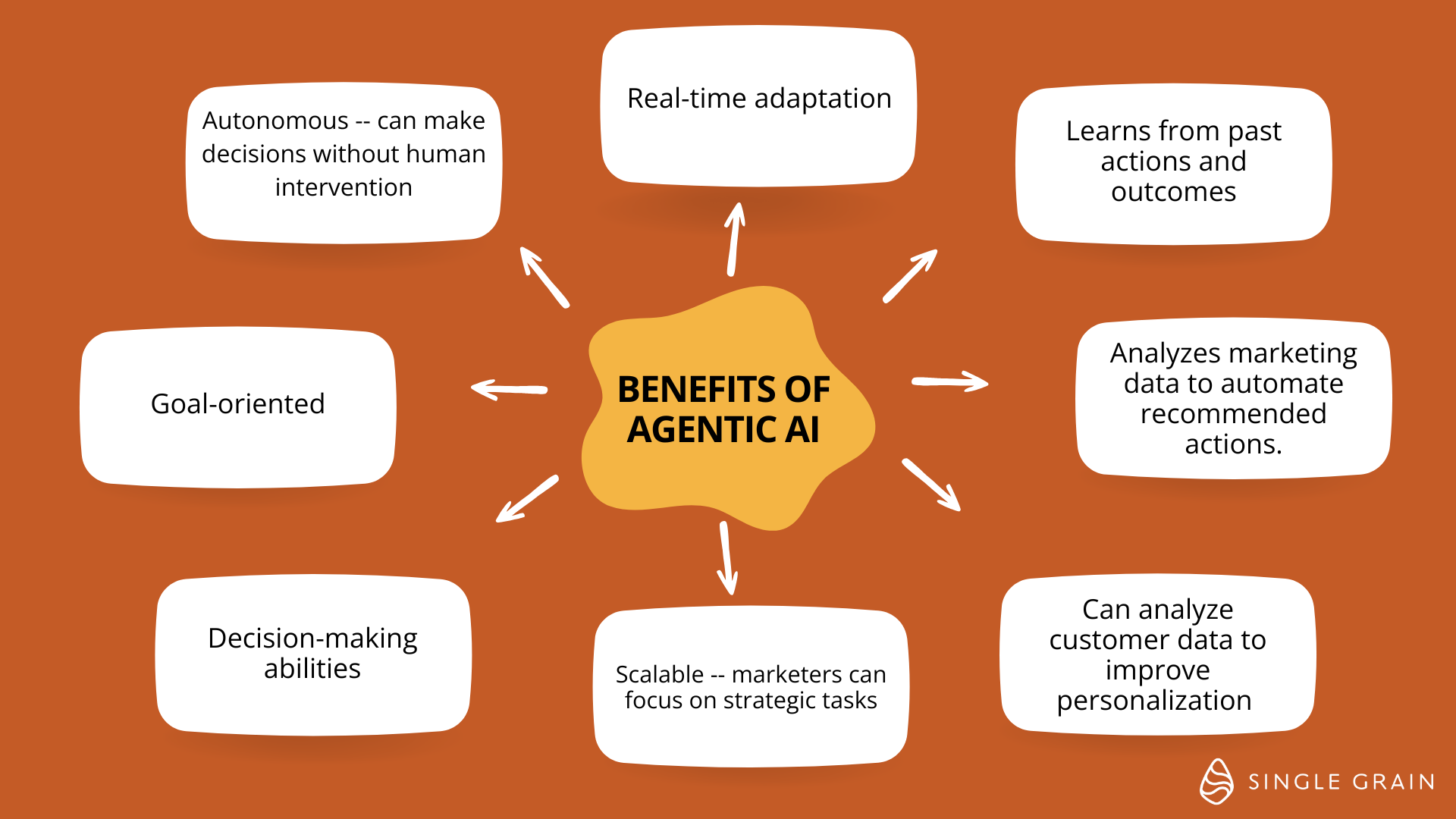
The most prominent advantage marketers will experience with agentic AI is its ability to automate various decision-making tasks and transform how a brand markets to customers. But that’s not where the benefits of agentic AI end. Here are additional advantages that marketers will experience.
- Autonomy: Agentic AI agents can make decisions without human intervention. They don’t just process data—they act upon it.
- Real-time adaptation: It can take and adjust its actions based on immediate feedback. This helps agentic AI technology solve complex challenges and make rational decisions.
- Learning capability: AI agents continuously improves its decision-making process by learning from past actions and outcomes.
- Goal-oriented: The AI is programmed with specific objectives, such as optimizing a marketing campaign, increasing customer engagement, or driving conversions.
- Automation: Agentic AI can analyze data from all marketing strategies and recommend specific actions (to be made either manually or automatically) for marketers to achieve their goals.
- Decision-making abilities: Because it can analyze complex datasets, agentic AI can make real-time marketing decisions, vital for high-stakes industries such as finance and healthcare.
- Scalability: Agentic AI can handle repetitive tasks such as data collection and sending marketing emails. Therefore, marketers can better scale their operations and use humans for more strategic roles.
- Personalization: AI agents can collect and analyze customer data, such as how your audience interacts with your brand. This will help your brand deliver personalized experiences, resulting in stronger customer relationships.
- Always on demand: Agentic AI tools can constantly monitor your marketing campaign and inform marketers of critical findings. When used for customer service, such as chatbots, consumers can always get the help they need.
This level of intelligence enables Agentic AI to be more than a tool—it becomes a proactive and decision-making agent for your marketing team.
How Agentic AI is Transforming Digital Marketing
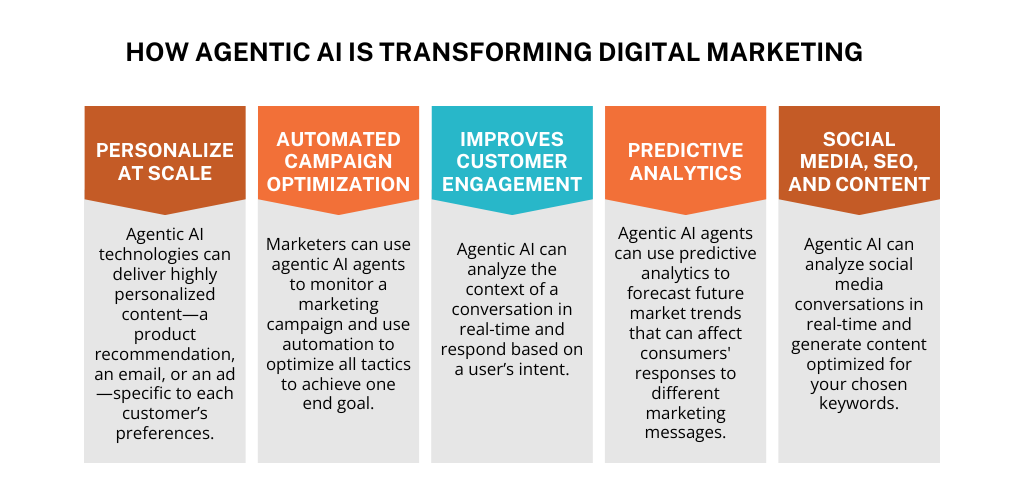
The agentic AI system is changing the way marketing teams operate. Here’s a deeper look at how it impacts various aspects of a digital marketing campaign.
Personalization at Scale
34% of B2C marketers state they always personalize their marketing experience. When brands prove they understand a customer’s interests and preferences, it strengthens the bond between business and consumer.
Traditional personalization methods often fall short because they rely on limited data or static rules. Agentic AI, on the other hand, can use vast amounts of data to create highly personalized experiences.
For example, agentic AI agents can analyze real-time customer behavior, such as browsing history, purchase patterns, and engagement with previous marketing materials.
Some of the ways in which agentic AI can personalize the marketing experience include:
- Hyper-personalized content creation: Agentic AI technologies can deliver highly personalized content—a product recommendation, an email, or an ad—specific to each customer’s preferences.
- Base responses on interactions: As consumers interact with a brand, Agentic AI adapts the marketing message based on their evolving needs and behaviors. For example, if a consumer abandons a shopping cart, the AI can trigger a personalized reminder or offer, increasing the likelihood of conversion. If a user interacts with an ad, the AI can dynamically adjust the content to better resonate with that individual’s interests.
- Real-time personalization: Agentic AI continuously learns from ongoing interactions, ensuring that every piece of content or communication is relevant to the customer at that precise moment.
This level of personalization increases engagement, boosts customer satisfaction, and increases the likelihood of conversions.
Automated Campaign Optimization
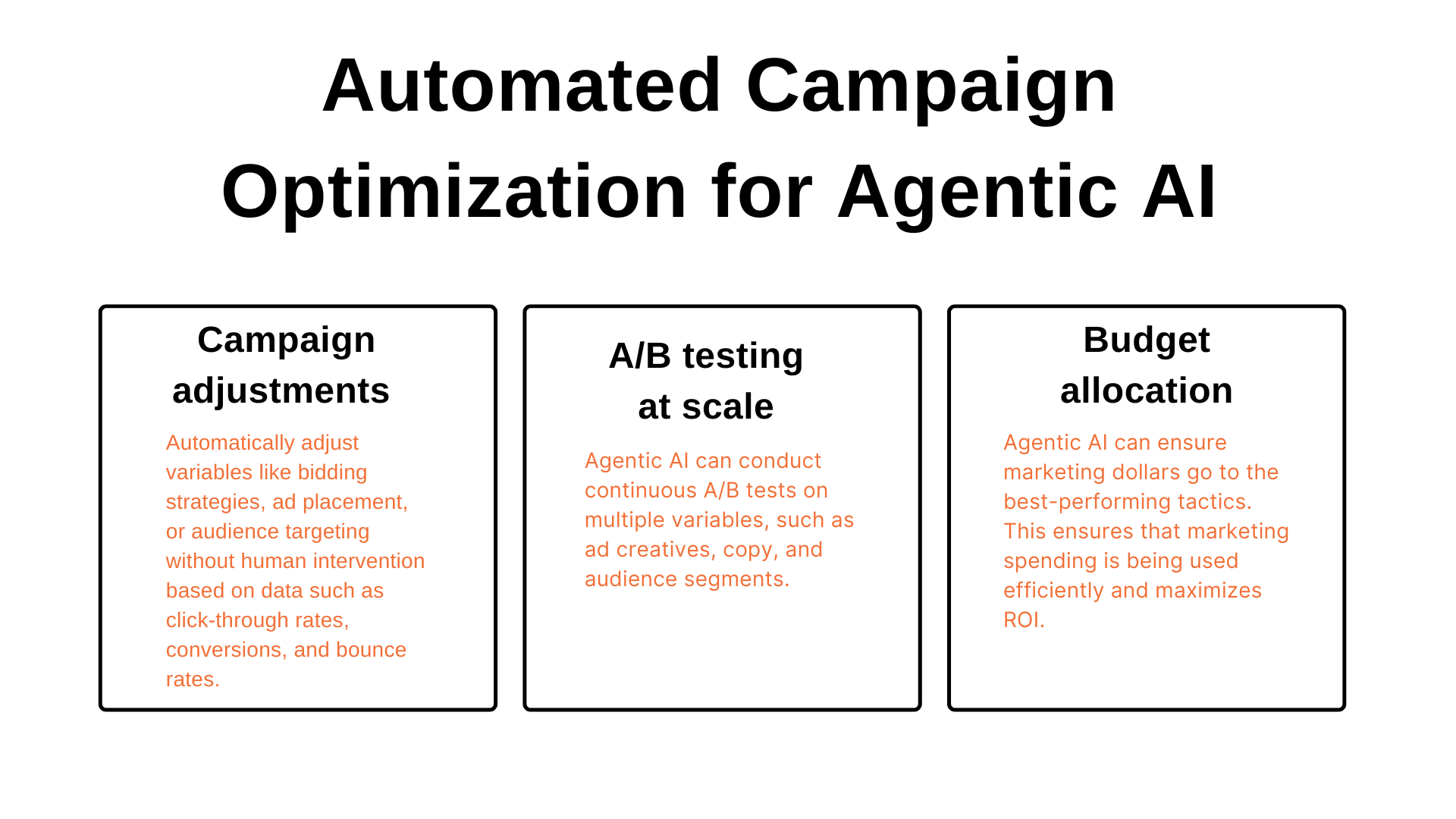
Campaign management can be time-consuming and complex, especially when managing multiple channels, platforms, ads, and audiences. Marketers can use agentic AI agents to monitor a marketing campaign and use automation to optimize all tactics to achieve one end goal. Some of the ways in which it does that include:
- Real-time campaign adjustments: AI agents can automatically adjust variables like bidding strategies, ad placement, or audience targeting without human intervention based on data such as click-through rates, conversions, and bounce rates.
- A/B testing at scale: Agentic AI can conduct continuous A/B tests on multiple variables, such as ad creatives, copy, and audience segments.
- Budget allocation: Agentic AI can ensure marketing dollars go to the best-performing tactics. This ensures that marketing spending is being used efficiently and maximizes ROI.
The aid of AI agents allows marketers to run more cost-effective and performance-driven campaigns by eliminating the guesswork of campaign management.
Improving Customer Engagement With Conversational AI
Conversational AI agents like chatbots and virtual assistants have become vital to digital marketing. Agentic AI takes these bots a step further; their communications move beyond basic scripted responses and engage customers more meaningfully and personally. Here are some of agentic AI’s capabilities in customer communication and engagement.
- Context-aware interactions: AI agents can analyze the context of a conversation in real-time and respond based on a user’s intent.
- Lead quality: Agentic AI-powered chatbots can automatically qualify leads based on specific criteria, such as purchase intent, budget, or interests. This streamlines the sales funnel and ensures that sales teams only focus on the most promising leads.
- 24/7 availability: AI-powered chatbots can engage with customers anytime, offering round-the-clock support and assistance. This ensures that no lead is lost.
Agentic AI-powered conversational tools strengthen customer relationships and increase engagement rates by providing a more personalized and responsive experience. However, optimizing your marketing strategy for customer responses and lead generation will take these results further. Consider giving us a call, and we’ll craft a customized marketing plan for your brand, informed by our proprietary agentic AI workflows.
Predictive Analytics for Smarter Marketing Decisions
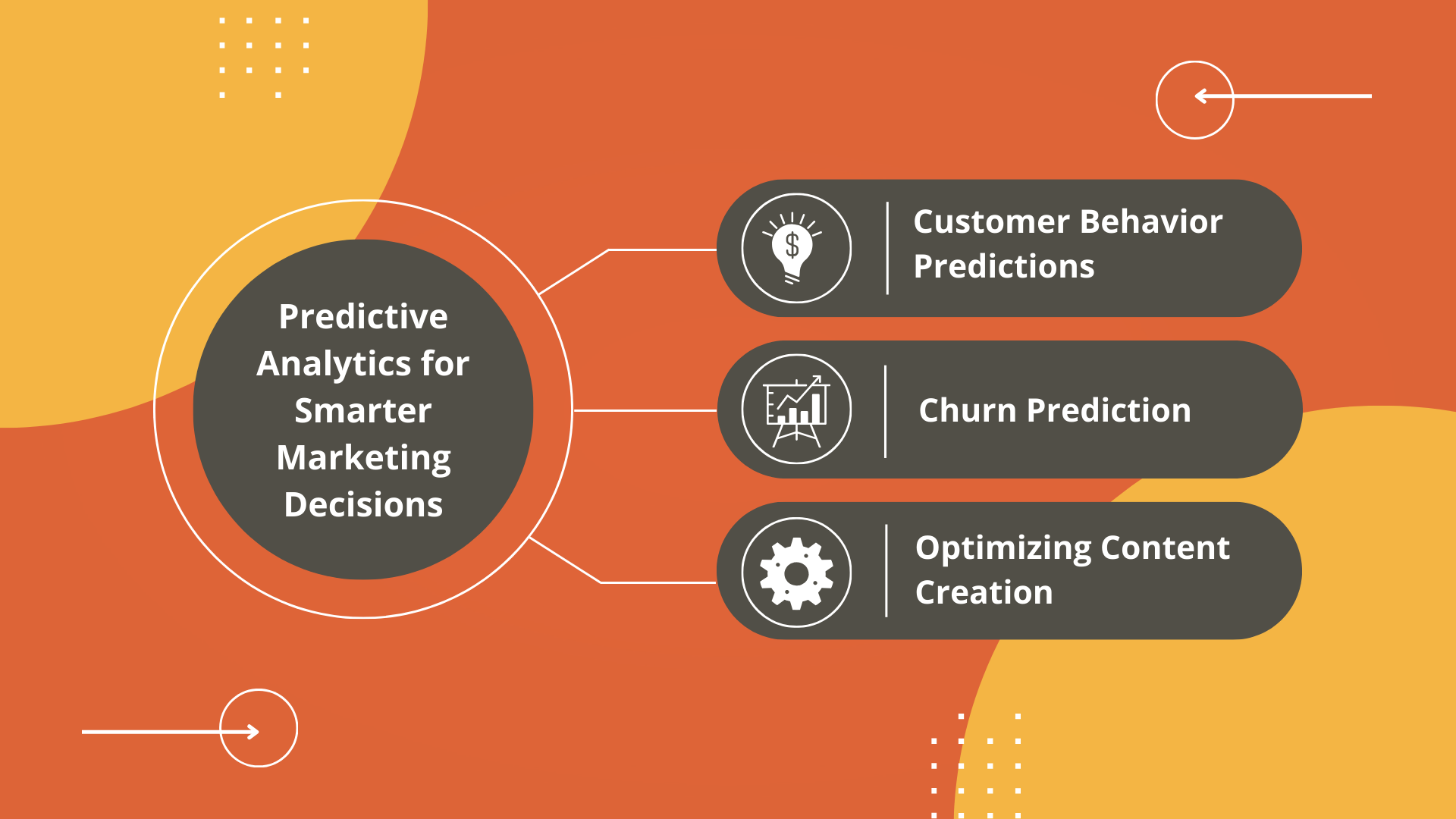
Predictive analytics improve marketers’ understanding of their audience’s behavior and which messages will yield more success. In addition to analyzing customer behavior patterns, agentic AI agents can forecast future market trends that can affect consumers’ responses to different marketing messages. Here are other ways agentic AI and predictive analytics will help marketers make more informed marketing decisions.
- Customer behavior prediction: Agentic AI can analyze customer interactions to predict which products or services a customer is likely interested in, enabling more accurate targeting and personalized recommendations.
- Churn prediction: Through predictive models, agentic AI can identify customers at risk of churning, allowing marketers to take proactive steps to retain them (such as offering a discount or sending a personalized message).
- Optimizing content creation: Agentic AI uses feedback loops to seek new data and refine its existing customer model. This data can predict which types of content are most likely to resonate with specific segments.
Enhancing Social Media Marketing With Sentiment Analysis
Marketers must understand how emotions and conversations impact results to achieve a successful social media strategy. This is called sentiment analysis, and agentic AI is a game-changer in our understanding of our audience and the way they feel when engaging on social media. Here’s how agentic AI agents conduct sentiment analysis:
- Real-time sentiment monitoring: Agentic AI can analyze social media conversations in real-time to gauge public sentiment about a brand, product, or campaign. This allows marketers to adjust their messaging and address positive and negative feedback.
- Competitor insights: In monitoring competitors’ social media and how their followers interact with them, agentic AI can provide valuable insights into what’s working (or not working) for them. Marketers can leverage this data to capitalize on opportunities.
- Crisis management: If negative sentiment suddenly spikes, agentic AI can quickly alert marketers, allowing them to respond proactively and minimize damage.
Improved SEO and Content Strategy
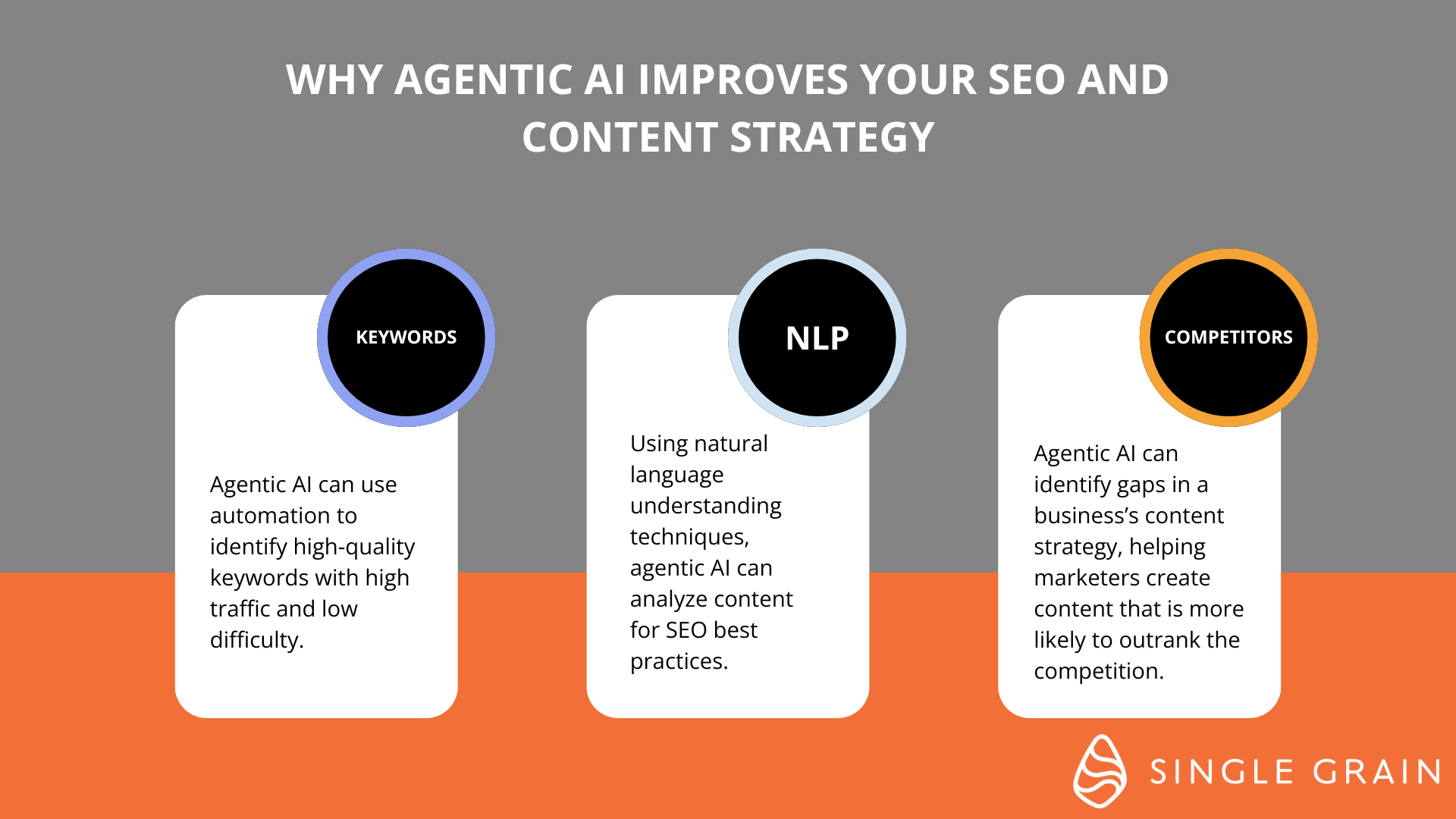
Agentic AI agents can significantly improve SEO efforts by generating content optimized for your chosen keywords and adhering to the SEO best practices that align with your goals. Here are specific tactics that agentic AI is capable of:
- Automated keyword research: Agentic AI can identify high-quality keywords with high traffic and low difficulty.
- Content optimization: Using natural language understanding techniques, agentic AI can analyze content for SEO best practices and suggest improvements.
- Competitor content analysis: Agentic AI can identify gaps in a business’s content strategy, helping marketers create content that is more likely to outrank the competition.
The most significant benefit to agentic AI is that it frees up valuable time for marketers to focus on high-level strategy while ensuring their content ranks higher and attracts more visitors.
While agentic AI can benefit your SEO campaign, you’ll still need experts on your side. If you’re handling SEO in-house and need to improve your SEO efforts, it may be wise to trust the professionals before switching to agentic AI.
Risks When Using Agentic AI
With the rise of agentic AI comes the need for responsible use. Data privacy, transparency in AI decision-making, and the ethical implications of AI in marketing must be addressed before marketers can integrate this technology into their campaigns.
But these aren’t the only risks when implementing agentic AI. Here are the other challenges that marketers will face.
- Loss of control: While many marketers welcome an autonomous AI decision-maker, others may fear that the outcomes aren’t as reliable as ones determined by humans. This loss of control may result in unexpected issues.
- Biases: Even though agentic AI can review data and better predict trends and behaviors, there’s always the risk of a biased outcome. This is especially harmful during customer interactions, where inequality and discrimination may dampen a company’s reputation.
- Security: As with all technology, agentic AI is vulnerable to hacking and manipulation. Without proper protection, hackers may infiltrate agentic AI programs to steal data.
- Job loss: Since agentic AI can mimic human decision-making, this may decrease the number of customer service, marketing, and HR jobs available.
- Over-relying on agentic AI: While agentic AI is a critical decision-making tool, over-relying on this technology can dampen oversight and lead to potential marketing problems.
- Ethics: Marketers may question if using agentic AI for decision-making is the best idea. This is especially true in industries such as law enforcement and healthcare, where interacting with the public and making sudden decisions occur more frequently.
Using marketing AI responsibly is critical. If your organization lacks experience in this area, your long-term growth can have serious consequences. Instead, consider working with an organization that has expertise in marketing AI.
The Future of Agentic AI in Digital Marketing
Today, AI can process vast amounts of data and operate with near-human intelligence and sentiment. This trend will only grow as agentic AI improves its ability to predict trends, learn customer behaviors, make strategic decisions, and develop keen intuition.
In addition, agentic AI will be the norm for all industries. Marketers can integrate agentic AI technology with other marketing tools and platforms, easing the path to fully automated workflows.
Agentic AI Can Transform Your Marketing Campaign
Agentic AI is reshaping the digital marketing scene, allowing marketers to automate complex tasks, improve personalizations, and make data-driven decisions in real-time. From improving customer engagement to optimizing campaigns and predicting future trends, agentic AI will transform the way marketers work.
While businesses that embrace agentic AI will have a significant advantage, addressing ethical issues before implementing this technology will ensure marketers can automate essential tasks while minimizing potential data privacy and transparency issues.
With its ability to mimic human decision-making, agentic AI will reshape the marketing world and create new standards for how marketers implement their strategies and interact with customers.
Agentic AI offers many benefits, but you’ll still be left in the dark if you’re inexperienced at marketing. Contact us and discover how we can use AI and automation to grow your brand.
If you’re ready to level up your brand’s marketing with agentic workflows, Single Grain’s AI marketing experts can help!👇
Frequently Asked Questions About Agentic AI
-
How does agentic AI differ from other automation programs?
Your marketing team is likely already automating many tasks, such as social media posting and lead scoring. What makes agentic AI different from robotic process automation (RPA)?
RPA software focuses on automating repetitive tasks using pre-defined rules. Agentic AI works independently, basing its actions on its real-time analysis of different datasets.
Should you continue using RPA software or switch to agentic AI technology? That depends on your end goal. Suppose you need robust AI that can adapt to a changing marketing environment and offer decision-making for high-stakes industries and enterprise-level companies. In that case, agentic AI is worth the switch.
-
What is an agentic workflow?
An agentic workflow refers to the entire AI system completing various marketing tasks. Agentic workflows can adapt to a predesigned campaign and act autonomously. This enhances efficiency in marketing campaigns, so all marketers have to do is analyze the results.
-
How does agentic AI personalize the customer experience?
Agentic AI analyzes behaviors such as past purchases, browsing, and previous interactions to recommend products, offer discounts and sales, and create content that will drive results. As a whole, agentic AI can adapt a marketing campaign to fit a specific audience type to ensure the message meets the end goal.
If you were unable to find the answer you’ve been looking for, do not hesitate to get in touch and ask us directly.
For more insights and lessons about marketing, check out our Marketing School podcast on YouTube.
Source link
#Agentic #Revolutionizing #Digital #Marketing
